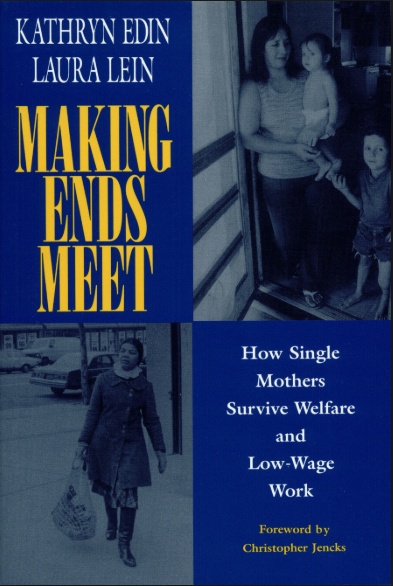Jencks on Incentives and Single Motherhood

A striking passage from Christopher Jencks' foreword to Edin and Lein's Making Ends Meet:
Some conservatives oppose all efforts to help single mothers balance their budgets, even when the mother works. They argue that making life easier for single mothers will just make them more numerous. For those who see single mothers as a major cause of the nation's social problems, cutting their numbers is even more important than reducing material hardship.
Although liberals scoff publicly at these arguments, few really doubt that changing the economic consequences of single motherhood can affect its frequency. Imagine a society in which unmarried women knew that if they had a baby out of wedlock their family would turn them out, the father would never contribute to the baby's support, the government would give them no help, and no employer would hire them. Hardly anyone, liberal or conservative, doubts that unwed motherhood would be rarer in such a society than it is in the United States today.
In a partially overlapping article, Jencks adds:
Those who want to discourage unwed motherhood could not create such a world, even if they wanted to. They cannot prevent parents from helping out daughters who become single mothers, keep employers from hiring such women, or stop men from marrying them. They can mount "just say no" campaigns to discourage unwed motherhood, but there is not much evidence that these campaigns help. Legislators who want to discourage single motherhood therefore tend to focus on the one policy lever they really control: government assistance for single mothers and their children.
Jencks then reviews the evidence on the effect of government assistance on single motherhood, finding little sign that variations within the observed range matter. But he also notes that the observed range is narrow. So per the logic of his first passage, why shouldn 't the intelligent conservative conclude, "Then we need to double down and really cut welfare spending "?
Meta-point: If the effect of X on Y is small, you can draw two drastically different conclusions. You can either say:
"What we do won't matter much, so let's not try."
OR
"To really make a difference, we have to try a lot harder."
People usually "resolve" this dilemma with wishful thinking: surrender when you barely care, "Charge!" when you do. The wise reaction, however, is to ponder the value of the goal and the cost of past efforts. If the goal is crucial and past efforts have been weak, trying ten times harder is a reasonable response. If the goal is of dubious value and past efforts have been energetic, trying ten times harder is crazy. For example, I would prudentially advise the typical lazy college student to literally work ten times harder, because the payoff of college graduation is huge, and their current level of effort is so trivial. By the reverse logic, however, I favor abolishing foreign language requirements, because even fluency (a pipe dream!) provides trivial benefits for most people, and the typical high school already requires 2 or 3 years of study.
The post Jencks on Incentives and Single Motherhood appeared first on Econlib.
作者暂无likerid, 赞赏暂由本网站代持,当作者有likerid后会全部转账给作者(我们会尽力而为)。Tips: Until now, everytime you want to store your article, we will help you store it in Filecoin network. In the future, you can store it in Filecoin network using your own filecoin.
Support author:
Author's Filecoin address:
Or you can use Likecoin to support author: